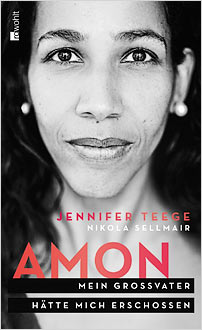review
Jennifer Teege was inspired to write her autobiography at the age of thirty-eight after finding out that her grandfather was the notorious Amon Göth, the commandant of Plaszów concentration camp near Kraków in Poland. Göth was portrayed as Oskar Schindler’s evil counterpart in Spielberg’s film Schindler’s List.
Jennifer, who is mixed-race, was given up for adoption by her mother and grew up in a loving adoptive family. When she finishes school she decides to go work in a Kibbutz in Israel, where she stays to attend university and makes friends for life. Back in Germany she comes across a memoir written by her biological mother, with whom she lost contact years ago. Only then does she learn that her mother is the daughter of Amon Göth, the notorious commandant of Plaszów. Jennifer’s grandmother had lived with him for a number of years, in a house right by the camp. Teege describes her utter shock and shame: the knowledge that she is a close relation of one of the Nazi murderers shakes her very foundation and results in a deep depression.
Slowly she begins to make sense of the family secret and her personal history, beginning by renewing contact with her biological mother, Monika. She, too, is struggling to come to terms with her heritage. Both remember Monika’s late mother and Jennifer’s grandmother – Amon’s lover – as a kind and loving woman. To imagine that she had loved a sadistic and cruel killer is a very difficult burden for both of them. Jennifer describes her slow and painful process of healing, mainly enabled by finding the courage to turn to her old Israeli friends. As third generation Shoah survivors they find forgiveness in themselves and offer invaluable friendship, despite the appalling knowledge of the sufferings inflicted on their grandparents by Nazis like Amon Göth.
Jennifer Teege’s extraordinary position as a mixed-race, adopted child who only accidentally finds out about her appalling ancestry sounds like something from a work of fiction, but is all the more compelling for being true. Her autobiography poses questions about how to live with the legacy of the Nazi crimes which are of enduring interest to Anglo-American readers. This book is not only a deeply moving personal history, but also a wider exploration of the guilt and shame experienced by the descendants of Nazi perpetrators.




All recommendations from Autumn 2013